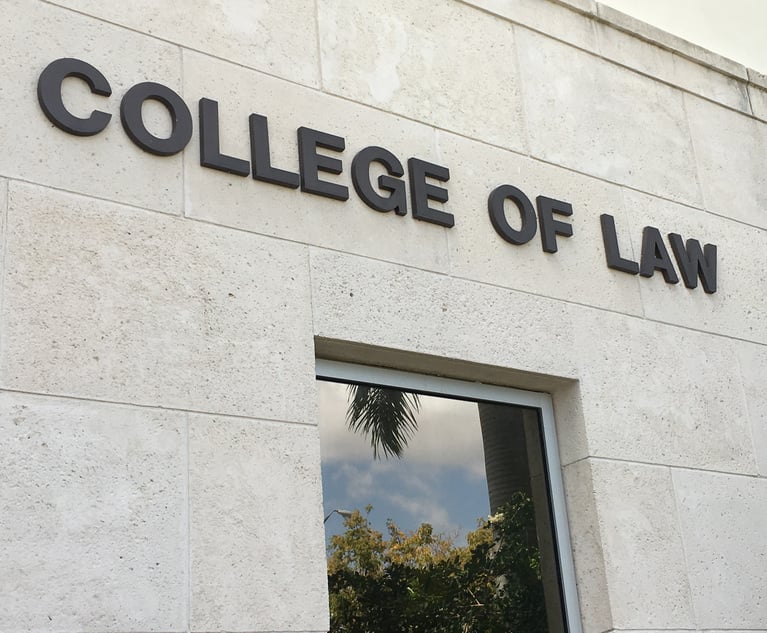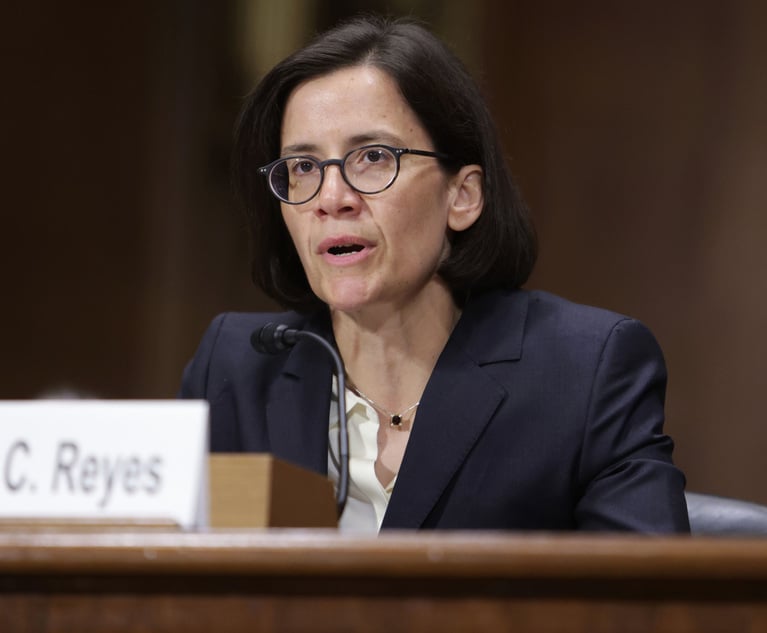Competition for Law Dean Jobs Heats Up
More people are vying for deanships as law school enrollment numbers have stabilized, experts say.
January 14, 2020 at 02:21 PM
5 minute read
 (Image: Shutterstock.)
(Image: Shutterstock.)
Melanie Leslie, dean of the Benjamin N. Cardozo School of Law, remembers the interview well.
She was sitting on a dean search committee, and the candidate told the interviewers that the school wasn't doing enough to highlight its strengths and what sets it apart from the competition. Naturally, the committee asked the candidate to expound on those strengths.
Silence. Followed by a platitude that could describe practically every law school in the country. Spoiler: That candidate didn't get the job.
Now that the legal education market is on the rebound, the competition for getting a deanship is stiffer, according to recruiters and sitting deans. At the same time, the appetite for law deans from nontraditional backgrounds—coming out of Big Law or the bench, for example—appears to have waned.
Legal educators and consultants at the Association of American Law Schools annual meeting earlier this month gathered on a panel that addressed the changing law dean market and what they see as major missteps dean-hopefuls are making in the interview process.
For a number of years, fewer people were vying for deanships because legal education's fortunes were uncertain and the job was particularly difficult, said Werner Boel, a consultant with search firm WittKieffer who has helped to place many law deans at schools across the country.
Boel noted that dean searches are getting a bit more competitive these days as law school enrollment numbers have stabilized and the job has become more attractive. Joining Boel on the panel at the conference Jan. 5 were Leslie; Dan Filler, dean at Drexel University Thomas R. Kline School of Law; Alicia Ouellette, dean of Albany Law School; and Patricia Salkin, former dean of Touro College Jacob D. Fuchsberg Law Center.
With more candidates competing for the positions, the panelists identified pitfalls interviewees make and some tips for snagging an offer.
Failing to do one's homework and understand the identity, strengths and weaknesses of a law school is one of the most common mistakes that aspiring deans make. Not being humble or showing enthusiasm for the job are among other frequent missteps, as is signaling that one views the deanship as a stepping stone to another job.
"It was amazing at the way dean candidates would shoot themselves in the foot during the interview process," Leslie said. "The main problem was ambivalence. People want to be inspired."
Another point: Ascending to a deanship is often a marathon and not a sprint. Candidates may be up for the job numerous times before landing the gig, and aspiring deans should view each search as an opportunity to learn and hone their pitch for what they bring to the table.
Moreover, getting prepared to be a strong candidate starts early on through seeking out well-positioned mentors who can champion you and by serving on key administrative posts in the law school and even within the central university. Serving on dean search committees, both in the law school and in other programs, offers invaluable insights into how to be a strong candidates, the panelists said.
Here are a few other key points that surfaced during the discussion:
- Don't wait to be asked to serve on leadership positions in the law school. Volunteer for duties that will expose you to many different departments within the law school to better understand their functions. Let people in the central university administration know you are interested in service, since presidents and provosts are often the real decision-makers.
- Build relationships with sitting deans and other influencers who can create a buzz around you and float your name when dean searches arise.
- Once you've been identified as a candidate, spend the time to really understand the law school—what it's doing well and the areas in which it can improve. But keep your pitch somewhat general. It's difficult to understand, at least as an external candidate, where landmines exist among the faculty.
- Use the search consultants as a resource to better understand what the school's search committee is looking for, and keep them informed if your feelings about the job change.
- Do a moot committee interview to hone your pitch.
- Get a sense of the school's financial picture. Request a copy of the budget.
- Be nice to the law school's staff. Rudeness has sunk the bids of more than one candidate.
- Don't waste the time of search committees by entertaining deanships at schools and geographic locations that don't actually interest you.
On a final note, Leslie said that no one actually knows how to run a law school until he or she has done it for a while. Being an academic doesn't qualify one, essentially, to manage a business and a large workforce. One can serve on committees and get a sense of the demands that come with being a dean, but taking the job requires a certain leap of faith of learning as one goes.
"Don't take yourself out of the running because you're smart enough to know you don't know how to run anything," Leslie said.
This content has been archived. It is available through our partners, LexisNexis® and Bloomberg Law.
To view this content, please continue to their sites.
Not a Lexis Subscriber?
Subscribe Now
Not a Bloomberg Law Subscriber?
Subscribe Now
NOT FOR REPRINT
© 2025 ALM Global, LLC, All Rights Reserved. Request academic re-use from www.copyright.com. All other uses, submit a request to [email protected]. For more information visit Asset & Logo Licensing.
You Might Like
View All
Justified Termination Does Not Bar Associate Attorney From Unemployment Benefits, State Appellate Court Rules
5 minute read
Florida Law Schools Are Seeing a Bump in Applications for 2025, After Recent Declines at Flagship Schools
3 minute read
Federal Judge Warns of 'Serious Sanctions' on FDIC Over Document Retention
3 minute read
Hogan Lovells, Jenner & Block Challenge Trump EOs Impacting Gender-Affirming Care
3 minute readTrending Stories
- 1DC Circuit Keeps Docs in Judge Newman's Misconduct Proceedings Sealed
- 2Litigators of the Week: US Soccer and MLS Fend Off Claims They Conspired to Scuttle Rival League’s Prospect
- 3Litigator of the Week Runners-Up and Shout-Outs
- 4U.S.- China Trade War: Lawyers and Clients Left 'Relying on the Governments to Sort This Out'
- 5Willkie Adds Five-Lawyer Team From Quinn Emanuel in Germany
Who Got The Work
J. Brugh Lower of Gibbons has entered an appearance for industrial equipment supplier Devco Corporation in a pending trademark infringement lawsuit. The suit, accusing the defendant of selling knock-off Graco products, was filed Dec. 18 in New Jersey District Court by Rivkin Radler on behalf of Graco Inc. and Graco Minnesota. The case, assigned to U.S. District Judge Zahid N. Quraishi, is 3:24-cv-11294, Graco Inc. et al v. Devco Corporation.
Who Got The Work
Rebecca Maller-Stein and Kent A. Yalowitz of Arnold & Porter Kaye Scholer have entered their appearances for Hanaco Venture Capital and its executives, Lior Prosor and David Frankel, in a pending securities lawsuit. The action, filed on Dec. 24 in New York Southern District Court by Zell, Aron & Co. on behalf of Goldeneye Advisors, accuses the defendants of negligently and fraudulently managing the plaintiff's $1 million investment. The case, assigned to U.S. District Judge Vernon S. Broderick, is 1:24-cv-09918, Goldeneye Advisors, LLC v. Hanaco Venture Capital, Ltd. et al.
Who Got The Work
Attorneys from A&O Shearman has stepped in as defense counsel for Toronto-Dominion Bank and other defendants in a pending securities class action. The suit, filed Dec. 11 in New York Southern District Court by Bleichmar Fonti & Auld, accuses the defendants of concealing the bank's 'pervasive' deficiencies in regards to its compliance with the Bank Secrecy Act and the quality of its anti-money laundering controls. The case, assigned to U.S. District Judge Arun Subramanian, is 1:24-cv-09445, Gonzalez v. The Toronto-Dominion Bank et al.
Who Got The Work
Crown Castle International, a Pennsylvania company providing shared communications infrastructure, has turned to Luke D. Wolf of Gordon Rees Scully Mansukhani to fend off a pending breach-of-contract lawsuit. The court action, filed Nov. 25 in Michigan Eastern District Court by Hooper Hathaway PC on behalf of The Town Residences LLC, accuses Crown Castle of failing to transfer approximately $30,000 in utility payments from T-Mobile in breach of a roof-top lease and assignment agreement. The case, assigned to U.S. District Judge Susan K. Declercq, is 2:24-cv-13131, The Town Residences LLC v. T-Mobile US, Inc. et al.
Who Got The Work
Wilfred P. Coronato and Daniel M. Schwartz of McCarter & English have stepped in as defense counsel to Electrolux Home Products Inc. in a pending product liability lawsuit. The court action, filed Nov. 26 in New York Eastern District Court by Poulos Lopiccolo PC and Nagel Rice LLP on behalf of David Stern, alleges that the defendant's refrigerators’ drawers and shelving repeatedly break and fall apart within months after purchase. The case, assigned to U.S. District Judge Joan M. Azrack, is 2:24-cv-08204, Stern v. Electrolux Home Products, Inc.
Featured Firms
Law Offices of Gary Martin Hays & Associates, P.C.
(470) 294-1674
Law Offices of Mark E. Salomone
(857) 444-6468
Smith & Hassler
(713) 739-1250








